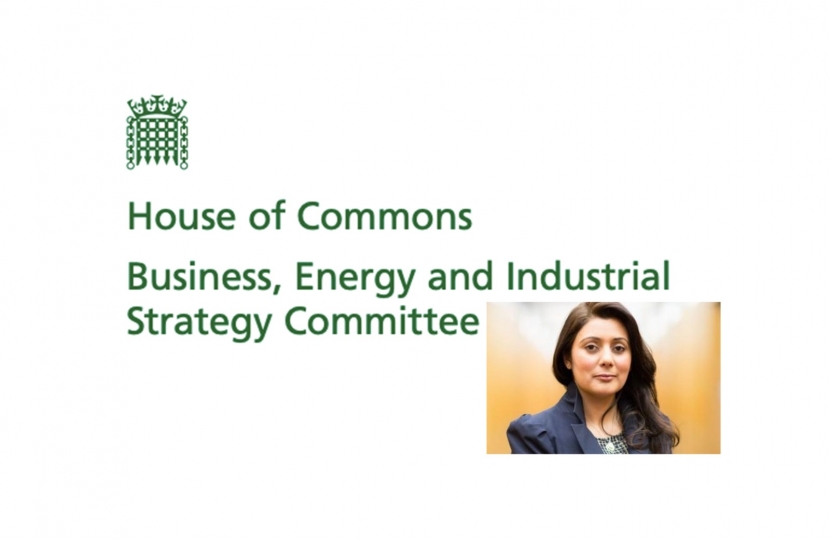
Introduction
Nus Ghani, MP for Wealden, sits on the influential Business, Energy and Industrial Strategy (BEIS) Committee, a role she took up in March 2020. The Committee scrutinises the policy, spending and administration of the Department for Business, Energy and Industrial Strategy and its public bodies, including Ofgem, the Financial Reporting Council and the Committee on Climate Change.
During her time as a member of the Committee, Nus has played an active role across a variety of inquiries, ranging from helping businesses set realistic COP26 targets through to the impact of Covid-19 on the workforce. Her inquiry into Uyghur slave labour in UK supply chains is thought to have been a contributing factor in her being sanctioned by the Chinese Communist Party in late March 2021.
What does the BEIS Committee do?
The BEIS Committee scrutinises the policy, spending and administration of the Department for Business, Energy and Industrial Strategy and its public bodies, including Ofgem, the Financial Reporting Council and the Climate Change Committee. This wide-ranging remit sees the Committee examine a huge amount of complex, nuanced issues.
Who's on the Committee?
Inquiry into Uyghur forced labour in Xinjiang and UK value chains
In September 2020, Nus and the Committee launched an inquiry forced labour in UK supply chains, with a particular focus on Xinjiang, a Northwestern region in China, and the Uyghurs. This inquiry (which can be viewed here) saw the Committee take evidence from a wide range of multinationals and organisations operating in tech, fashion and human rights sectors. The Committee published a Report on the 17 March 2021, which received widespread coverage.
Speaking at the launch of the Report, Nus stated:
“It is deeply concerning that companies selling to millions of British customers cannot guarantee that their supply chains are free from forced labour. Modern slavery legislation and BEIS Department policy are not fit for purpose in tackling this grave situation. The Government must act to strengthen the Modern Slavery Act, introduce a tougher business policy framework, and examine the use of targeted sanctions to ensure every effort is made to stamp out profiteering from these abuses.
“Amid mounting evidence of abuses, it is deeply disappointing that the Government appears to lack the urgency and commitment to take the tough action which is both necessary and overdue. Amid compelling evidence of abuses, there has been a sorry absence of significant new Government measures to prohibit UK businesses from profiting from the forced labour of Uyghurs in Xinjiang and other parts of China.”
You can watch Nus discussing the Report's recommendations with Ian King on Sky here.
The Report was covered widely:
- BBC News - Uighur abuse: MPs criticise companies over China forced labour
- The Guardian - UK must fix modern slavery laws to help protect Uighurs in China, say MPs
- Financial Times - MPs demand stronger laws to combat modern slavery
- Daily Telegraph - Disney under fire from MPs over Mulan shoot in Uighur territory
- Sky News - Uighurs: MPs 'appalled' firms can't guarantee supply chains free of forced labour in China
- Yahoo Finance - 'Compelling evidence' of Chinese forced labour links with UK companies
- City AM - Government should crack down on Uighur forced labour in business supply chains, MPs say
- Drapers - Pressure mounts on government to tackle Xinjiang forced labour
- Just-Style - "UK urged for tougher measures on Xinjiang forced labour"
- RepublicWorld - UK MPs Urge Govt To 'toughen' Laws Against Use Of Forced Uyghur Labour In China's Xinjiang
The Committee described the Report as follows:
The report expressed concern about the potential flow of information between TikTok UK, its parent company ByteDance Ltd and other subsidiary companies (such as ByteDance (HK) Ltd), which could be subject to China's National Intelligence Law. The BEIS Committee invited TikTok to publish independently verified governance and data flow arrangements to confirm full legal separation between TikTok UK and other ByteDance Ltd group companies. The report found it “clearly unacceptable” that Boohoo was found to have only minimal data about the different tiers in their supply chain, resulting in labour abuses in the UK. However, it welcomed Sir Brian Leveson’s review at Boohoo and encouraged other companies to undertake independent inquiries into their due diligence policies. It also noted that the Committee is “deeply disappointed” that The Walt Disney Company declined the invitation to give oral evidence, and to engage meaningfully with the Committee’s inquiry, and found that Disney still has many questions to answer relating to its conduct in Xinjiang, principally in relation to the production of Mulan in the region. The report included a series of recommendations to strengthen the Modern Slavery Act 2015 and strengthen the UK sanctions regime, and called on the BEIS Department to commit to full transparency in terms of official development assistance channelled to China.
Other inquiries
A selection of the inquiries Nus has played an active role in can be viewed below:
- Mineworkers’ Pension Scheme. When British Coal was privatised in 1994, an agreement was made between the Government and the Trustees of the Mineworkers Pension Scheme (MPS) on future arrangements for pensions. The Government guaranteed that pensioners would always receive the benefits they had earned up to privatisation, and that these benefits would increase in line with inflation. However, in return for this guarantee, the Government is also entitled to receive 50% of any surplus in the Scheme’s value at subsequent valuations (to the extent that these funds are not needed to maintain benefits). The remaining 50% of the surplus is to be distributed to pensioners through improved benefits. The Government has maintained that this arrangement works well. On 23 December 2020, a group of MPs representing coalfield communities wrote to the Chair of the Business Energy and Industrial Strategy Select Committee calling for an inquiry into the surplus sharing arrangements. The letter highlights that the Government has received over £4 billion from the scheme, but has made no contribution to it since 1994. Published 27 April 2020, the Report can be viewed here.
- Uyghur forced labour in Xinjiang and UK value chains. Led by Nus, the Committee investigated the risks that UK based businesses face when engaging supply chains that originate in China and what more the Government can do to ensure that business and consumers in the UK do not perpetuate the forced labour of Uyghurs. Published on 17 March 2021, it can be viewed here.
- Pre-appointment hearing with the Government’s preferred candidate for the Chair of the Regulatory Policy Committee. This inquiry examined who should be the next Chair of the Regulatory Policy Committee (RCP), the first body in the UK set up to provide independent scrutiny of proposed regulatory measures put forward by Government. In 2012, the RPC became an independent advisory non‐departmental public body. Published 9 March 2021, it can be viewed here.
- Net zero and UN climate summits: Scrutiny of Preparations for COP26 – interim report. The second Report in this session on this issue. With COP26 taking place in Glasgow later this year, the BEIS Committee heard evidence from a wide range of involved stakeholders as to how the Government's preparation for the event was coming along. Published 23 February 2021, it can be viewed here.
- The impact of Coronavirus on businesses and workers: interim pre-Budget report. This report was a result of the inquiry into the impact of coronavirus on businesses and workers across the UK. The Committee made a set of recommendations prior to the Government's Budget the following week. Published on 23 February 2021, it can be viewed here.
- COP26: Principles and priorities—a POST survey of expert views. On 6 March 2020 the Business, Energy and Industrial Strategy Committee launched a standing inquiry into Net Zero and the UN Climate Summits. This inquiry drew together the views of over 500 experts working on international climate policy who participated in the survey. Published on 26 November 2020, the Report can be viewed here.
- My BEIS inquiry: proposals from the public. This inquiry invited stakeholders and the wider public to come forward with suggestions for issues and policy areas which they would like the Committee to investigate over the course of this Parliament. This was an opportunity for the Committee to be alerted to topics that deserve greater parliamentary scrutiny by a more diverse pool of stakeholders including, but not limited to: business representatives, academics, think tanks, campaign groups, charities, local authorities, consumer groups and citizens. Published on 11 July 2020, the Report can be viewed here.
- Liberty Steel and the Future of the UK Steel Industry. On 8 March 2021, the supply chain finance firm Greensill Capital collapsed into administration after months of speculation about its financial viability. Greensill was the principal financial backer of GFG Alliance, owner of Liberty Steel, which is the third largest steel manufacturer in the UK. The collapse of Greensill puts 5,000 jobs at risk at Liberty Steel and other firms. UK taxpayers are reported to be exposed to more than £1bn of debt from the collapse of Greensill via three Government guarantees, including a state-backed coronavirus lending scheme, which enabled Greensill to advance hundreds of millions of pounds to companies linked to GFG Alliance. On 28 March 2021, the Government rejected a request for £170m in financial support from Mr Gupta for Liberty Steel due to concerns over GFG Alliance's opaque accounting procedures. This raises questions about the effectiveness of auditing and corporate governance regulations, and about the risks posed to UK industry by high-risk financing methods. The UK steel industry has faced serious challenges for many years, particularly due to the excess of steel on the international market which has depressed prices, and which resulted in plant closures and staff lay-offs during the 2015/16 steel industry crisis. The sector is also grappling with the Government's ambitious target of 2035 to achieve net zero emissions in relation to steel production. Further details of the inquiry can be found here.
-
Net Zero Governance. The Business, Energy and Industrial Strategy Committee has launched an inquiry on net zero governance, which will examine the leadership and co-ordination which will be needed by government to deliver on the UK’s commitment to reach net zero by 2050. The Committee’s inquiry will examine the Department for Business, Energy and Industrial Strategy’s leadership role in delivering net zero, how effectively the Department is driving co-ordinated action across Whitehall and the role that devolved administrations and local and regional authorities can play. The inquiry will also examine the Government’s success in engaging with public sector bodies, regulators, businesses and citizens on net zero and the role and oversight of net zero performance metrics in Government. Details can be found here.
The BEIS Committee website is here - it lists all active and closed inquiries. You can follow the BEIS Committee on Twitter, @CommonsBEIS










